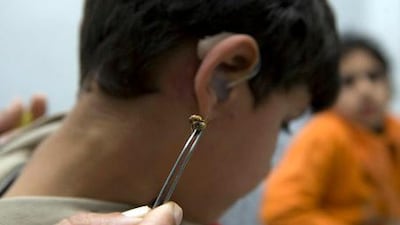GAZA CITY // When the first case of swine flu hit the Gaza Strip in December, residents in this tiny, impoverished enclave flocked to local spice traders and drained merchants' shelves of the popular medicinal herb anise. Gazans sought out the Chinese-grown plant to mix in an age-old, tea-based concoction called yansoon, which doctors here said would help prevent further outbreaks amid rumours the territory faced a shortage of the deadly flu's traditional vaccine. Anise is a central component of the swine flu vaccine manufactured globally under the brand name Tamiflu.
With a health system crippled by the Israeli economic blockade, which the United Nations says causes unnecessary delays for the import of vital medical equipment, the residents of Gaza are increasingly turning to cheaper, more accessible methods of alternative medicine to cure their ailments. A local beekeeper who runs a clinic using bee stings as a treatment in Gaza City said because of the blockade, he now sees upwards of a hundred patients each day. Also in the city, a pharmacist self-trained in traditional Chinese medicine said his business is growing in the wake of last year's war, in which health facilities here sustained considerable damage.
"When we're faced with the situation we have today with the healthcare system, where medicine and equipment are in short supply, and people don't have access, it's only logical they will turn towards alternative medical practices in order to get better," said the World Health Organisation's (WHO) national health officer in Gaza, Mahmoud Daher. From his modest, two-year-old clinic in the crowded Al Sabra neighbourhood, Mahmoud Shamali, 24, prepares Ahmed Kordia, 22, for a session of traditional Chinese therapy. His speciality is hujamma, known in the West when it was used in the 19th century and before as 'cupping", a method that uses pressurised suction cups to extract what Mr Shalami said is "bad blood" from a patient's body.
"People come here for everything - back pain, muscle weakness, anxiety," said Mr Shamali. "It is cheaper than pain medications or repeated visits to the doctor, and it lasts longer." The young pharmacist used a small utility knife to cut a series of tiny incisions at special points across Mr Kordia's back. He then placed several dome-shaped plastic cups atop the miniature cuts, and pressurised them with a vacuum he said he ordered from China and had smuggled in through the tunnels with Egypt.
Mr Kordia, lying face down on the table, grimaced as the blood poured from his back, transforming from mere droplets into rivers of blood that eventually turned the cups a bright red. "I feel fine, I feel more relaxed now," said Mr Kordia, who is unemployed. The procedure, which he has done once a month for his chronic back pain, costs him just 60 shekels (Dh59). It is much cheaper than buying imported medicine, he said.
At the home of Ratib Ibrahim Samour, this local beekeeper and his wife, Umm Ibrahim, move from patient to patient, gripping plastic jars swarming with honeybees. Mr Samour pinches one of the bees, squirming and wings flapping furiously, with a pair of tweezers, and stings a young girl wearing a hearing aid on the back of her ear. "I treat people for deafness, eyesight, sinus infections, pain," said Mr Samour, who opened the clinic in 2003 and has since trained his wife and two oldest children to treat people with the bees. "The venom of the bee activates the natural cortisone in the body, and this can help with many things, many sicknesses."
Kamal Ruka, from the southern Gaza Strip town of Khan Younis, needs a spinal operation in the coming months. But he cannot afford both the operation and the pain relief medication he needs while he waits for the surgery. Mr Ruka comes in every four to six weeks, he said, to be stung 15 times to alleviate the pain. It costs him just 10 shekels per session, while prescription drugs cost him 50 shekels per week, he said.
"I started coming to the clinic about a year ago, and I feel 100 per cent better," Mr Ruka said. "The pain from the bee is nothing compared to the pain I have." Mr Samour said he often turns patients away, however, because his bee-sting method is no substitute for modern medicine. He always asks patients what their real doctor's diagnosis is first. But because conventional drugs are often too expensive or in short supply, people are faced with no other choice but to seek out alternative healers.
According to the WHO, of the 480 drugs deemed "essential" by Gaza's health officials, approximately 20 per cent were listed as out of stock from March to December 2009. Of over 1,100 applications made by patients to leave Gaza to Israel for specialised medical treatment, 21 per cent were either denied or delayed, says the WHO. Twenty-seven patients died in 2009 waiting to be approved. "Because of the situation we are in after the war, and with the siege, people need this, they need my therapy," said Mr Shamali, adding people feel comfortable with him because his therapy, while Chinese, is rooted in Islam. "The Prophet Mohammed said bleeding is the best remedy," he said.
@Email:foreign.desk@thenational.ae

